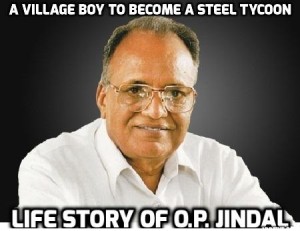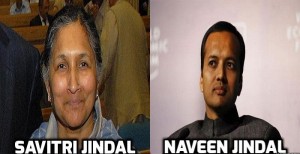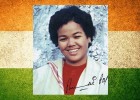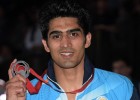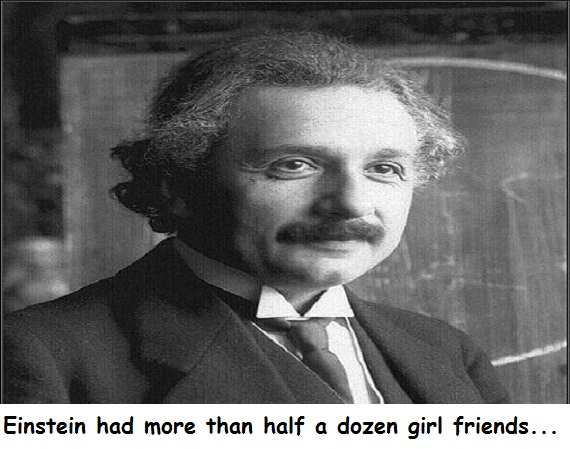“Where others saw walls, he saw doors” – Mr. O P Jindal’s mantra towards life challenges.
“A self made billionaire”– Forbes Magazine
The life story of O P Jindal is a symbol of courage, hard work and dedication that every ordinary human being possesses.
A village boy without having any formal engineering education, but with a keen interest in technology and machines- went on to become the steel tycoon of India.
Mr. O P Jindal, the founder chairman of Jindal group of industries was born in a village in the northern state of Haryana, India on August 7, 1930. His father was an ordinary farmer. From childhood, he had a keen interest in technology and engineering. Compelled by this natural instinct for machines, during his early days as a school student in his village, he would visit automobile repairing shops and volunteer to assist in repairing them. Understanding the working mechanism of machines would always fascinate him.
As his first step towards entrepreneurship, he started a small bucket manufacturing plant in 1952 in Hisar, a city adjacent to his village. At that time, even the ordinary pipes used in India were imported from England with “Made in England” markings on them. It inspired him to install a pipe manufacturing unit in 1964 and then a larger setup, Jindal Strips Limited in 1969 in Kolkata. It was his vision to make India self-reliant in every sector of the steel industry that made him the steel tycoon of India. As of Now, Jindal group, one of the largest business entities in India, is a $17 billion empire having interests mainly in steel, power, mining and engineering sector.
Unlike any typical entrepreneur, he was not just into financial matters of his factories- he would actively involve in the technical discussions. He kept on striving for the latest technology. He traveled extensively throughout the world to make sure that his industrial establishments don’t lag behind in technical innovations. He is being credited to bring new technological innovation in the Indian steel industry.
Not only into technical innovation, he was a visionary enough to take Jindal group global well before 1991 when the Indian government decided to become a liberal global economy.
During early childhood, he wished to become a wrestler. To his own surprise, his mother didn’t reject this idea at all. Instead, she taught him to be bold and courageous and not to lose hope if he lost any fight. As he grew older, he gave up the idea of wrestling, but, fought well against all the adversities to become a pioneer in the Indian steel industry.
He remained the chairman of N.C. Jindal Charitable trust, which was administrating a handful of educational institutes and hospitals.
In the later years of his life, he took a backseat on entrepreneurship and took his chances in politics to serve the society. He was a three time Member of Legislative assembly of Haryana and one time Member of Parliament of India. When he made his way into the Parliament of India in 1996, it was for the first time that an industrialist was elected to the Lok Sabha, the lower house of the parliament in India with a landslide victory. Otherwise, all industrial big guns used to directly make their way to the Rajya Sabha, the upper house of parliament without contesting any elections by exploiting their nexus with political parties. He was famous for spending from his own accounts in various public welfare projects in addition to Government spending.
His glorious, mutidirectional journey of life comes to a sudden, tragic halt when he died in an air crash on March 31, 2005. At the time of death, he was the serving Power minister of his native state, Haryana.
Then onwards, the business empire and related assets were transferred to Mrs. Savitri Jindal, wife of O P Jindal. According to the Forbes list of global billionaires, Savitri Jindal is ranked at 453rd place with a net worth of $3.5 billion (INR 23649 crores). Among Indians, her rank is 16th. The management of different entities of Jindal group of industries is looked after by their four sons.
Among his sons, Naveen Jindal is a two time former Member of Parliament of India with a considerable fan following. He is the CEO of Jindal Steel and Power Limited, one of the subsidiary of the Jindal group. He is a sports enthusiast with an interest in social reforms and charities.
After untimely demise, a number of educational, healthcare and social philanthropic initiatives has been started in his memory by his family.
O P Jindal’s Biography- A worth read
To mark the 75th birth anniversary of late O P Jindal, the then Prime Minister of India, Dr. Manmohan Singh unveiled a book in August, 2005- “The Man who talked to Machines: The life story of O P Jindal.”
“A highly successful industrialist with keen interest in philanthropy and Indian politics”– as said by Dr. Manmohan Singh, former Prime Minister of India on the occasion of releasing O P Jindal’s biography.
This book takes you to the wonderful journey of a village boy who went on to become the steel tycoon of India by building a multi-billion dollar industrial empire. Including a couple of photographs highlighting various phases of O P Jindal’s life, this book is a worth read. It is a story of hard work, dedication, courage and achievement.
The author of this biography, Anil Dharker is a renowned columnist and writer, also the Founder and Director of the Mumbai International Literary Festival. He has a couple of books under his belt including “The Romance of Salt about Mahatma Gandhi`s Dandi March.
Referneces
http://www.forbes.com/profile/savitri-jindal/
http://www.globalskillsummit.com/speaker_profiles/naveen.pdf
http://pib.nic.in/newsite/PrintRelease.aspx?relid=11030
http://economictimes.indiatimes.com/chairmanspeech.cms?companyid=4355&year=2005
http://www.tribuneindia.com/2005/20050401/haryana.htm#3
https://en.wikipedia.org/wiki/Anil_Dharker
